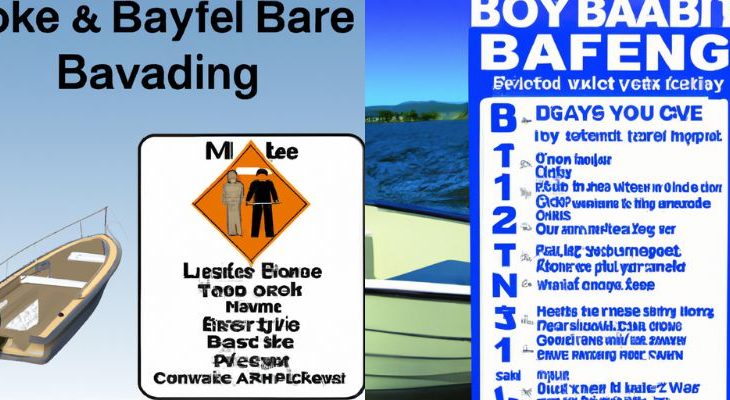Last updated on February 14th, 2024 at 01:01 pm
Last updated on February 14th, 2024
Boating is a popular pastime enjoyed by many people around the world. It is a great way to relax, have fun, and enjoy the great outdoors. However, boating can also be a dangerous activity if proper safety measures are not taken.
Boating laws are in place to help keep boaters safe on the water. In this article, we will discuss the importance of boating laws and how they can help keep you safe on the water.
Why are boating laws important?
Boating laws are important for several reasons. First and foremost, they help keep boaters safe. Boating accidents can be extremely dangerous and even fatal, and boating laws are designed to prevent these accidents from occurring. In addition, boating laws help protect the environment by regulating the use of boats and the disposal of waste.
What are some common boating laws?
There are many different boating laws in place to help keep boaters safe. Some of the most common boating laws include:
Life Jackets: Boaters are required to have a life jacket for each person on board their vessel. It is important to make sure that the life jacket is the appropriate size for each person.
Boating Under the Influence (BUI): Just like driving a car, it is illegal to operate a boat while under the influence of drugs or alcohol.
Navigation Lights: Boats must display navigation lights when operating between sunset and sunrise or in conditions of reduced visibility.
Speed Limits: Speed limits are in place in many areas to prevent accidents and protect wildlife.
Registration and Licensing: All boats must be registered and licensed, and operators must have a boating safety certificate in some states.
Boating Safety Equipment: Boaters must have certain safety equipment on board, such as fire extinguishers and distress signals.
Anchoring: Boats must be anchored in a way that does not cause damage to the environment or other boats.
What are some tips for staying safe on the water?
In addition to following boating laws, there are several other tips for staying safe on the water. These include:
Check the weather before you go: Make sure you are aware of any weather alerts or warnings before you head out on the water.
Know the water: Learn about the body of water you will be boating on, including any hazards or shallow areas.
Wear your life jacket: Even if you are a strong swimmer, it is important to wear a life jacket at all times.
Stay alert: Keep a lookout for other boats, swimmers, and any other potential hazards.
Don’t drink and boat: Boating under the influence is illegal and dangerous.
Practice safe towing: If you are towing a water skier or tuber, make sure you are using the appropriate equipment and following safe towing practices.
FAQs:
Q: Do all boats need to be registered and licensed?
A: Yes, all boats must be registered and licensed, and operators must have a boating safety certificate in some states.
Q: Do I need to wear a life jacket even if I am a strong swimmer?
A: Yes, it is important to wear a life jacket at all times, even if you are a strong swimmer.
Q: What should I do if I see another boat in distress?
A: You should stop and offer assistance if it is safe to do so. If you are unable to offer assistance, you should contact the nearest Coast Guard station or other emergency services.
Q: Can I operate a boat under the influence of drugs or alcohol?
A: No, it is illegal to operate a boat under the influence of drugs or alcohol, just like it is illegal to drive a car.
Q: What is the penalty for violating boating laws?
A: The penalties for violating boating laws can vary depending on the specific law and the severity of the violation. Penalties can include fines, imprisonment, or even the suspension of boating privileges.
Conclusion:
Boating can be a fun and relaxing activity, but it is important to take the necessary precautions to stay safe on the water. Boating laws are in place to help keep boaters safe and protect the environment.
By following these laws and taking other safety measures, such as wearing a life jacket and staying alert, you can help ensure a safe and enjoyable boating experience for everyone. Remember, always stay safe on the water with our boating laws.
………………….
Here are some references that may be helpful for those who want to learn more about boating laws and safety:
United States Coast Guard. (2021). Boating Safety. Retrieved from https://www.uscgboating.org/
National Safe Boating Council. (2021). Safe Boating Campaign. Retrieved from https://www.safeboatingcampaign.com/
American Boating Association. (2021). Boating Laws and Regulations. Retrieved from https://www.americanboating.org/laws-and-regulations
Boat-ed. (2021). Boating Safety Course & Online Boater License. Retrieved from https://www.boat-ed.com/
National Oceanic and Atmospheric Administration. (2021). National Weather Service. Retrieved from https://www.weather.gov/
It is important to check with your local boating authorities for any specific laws and regulations that may apply to your area.





